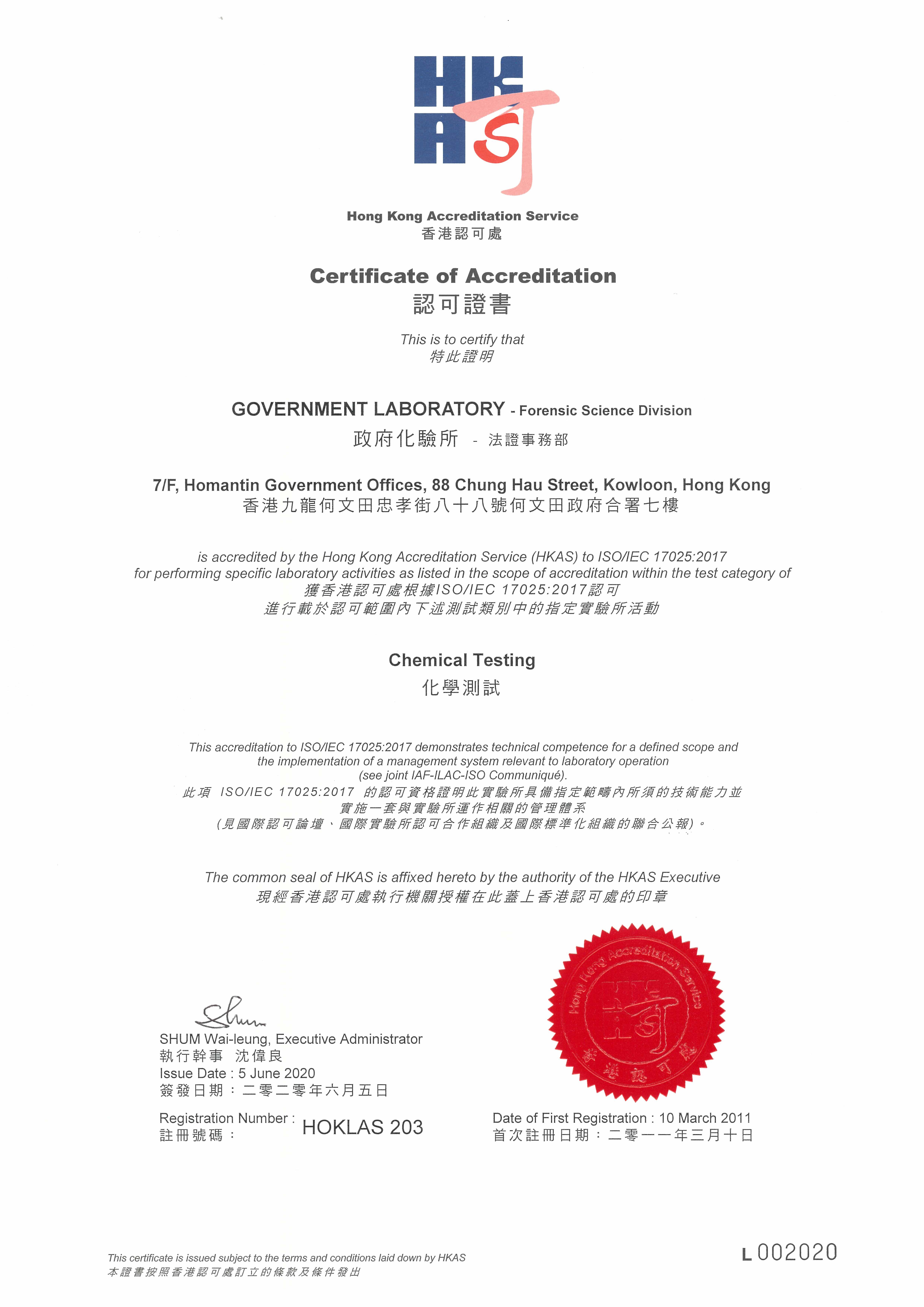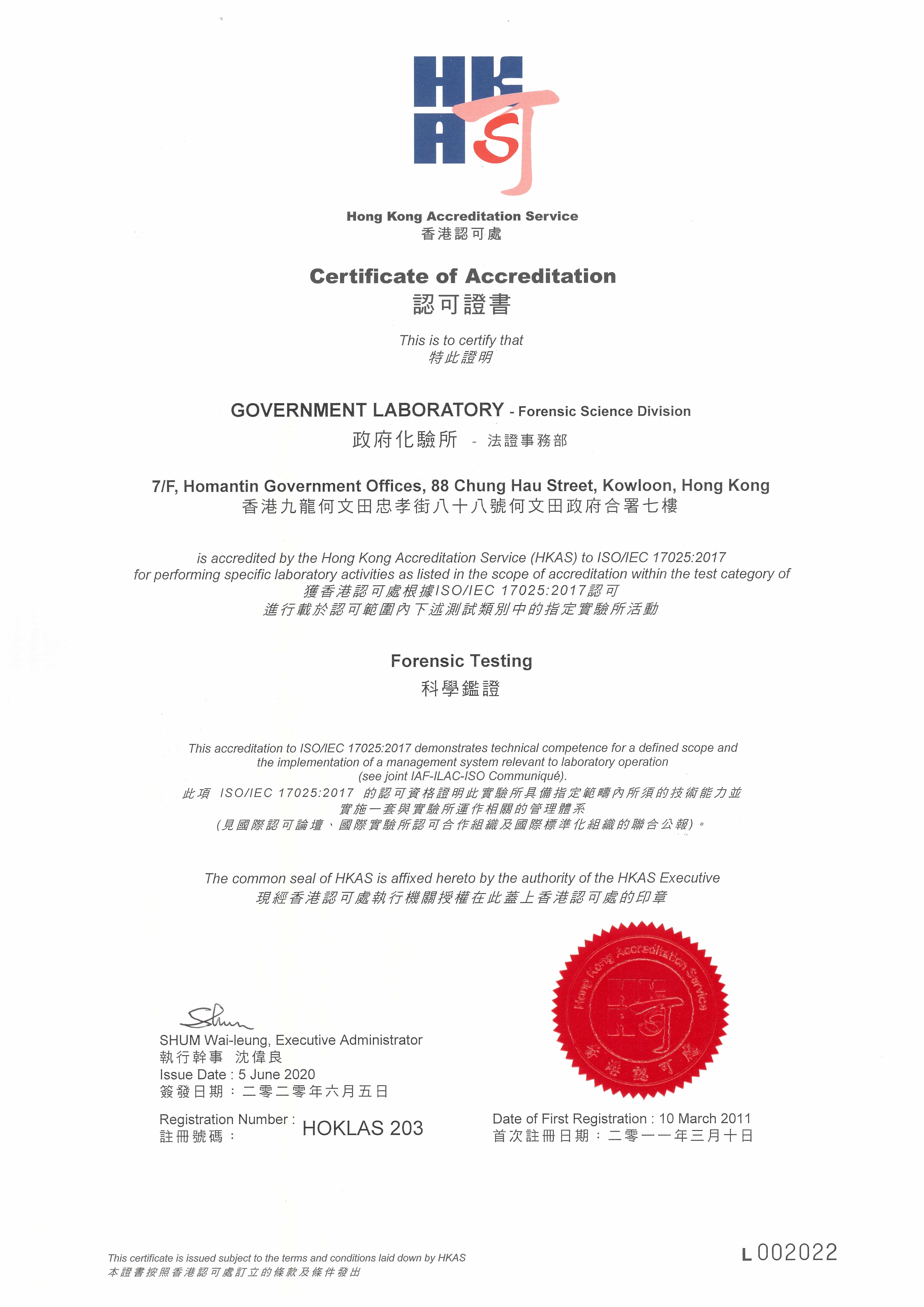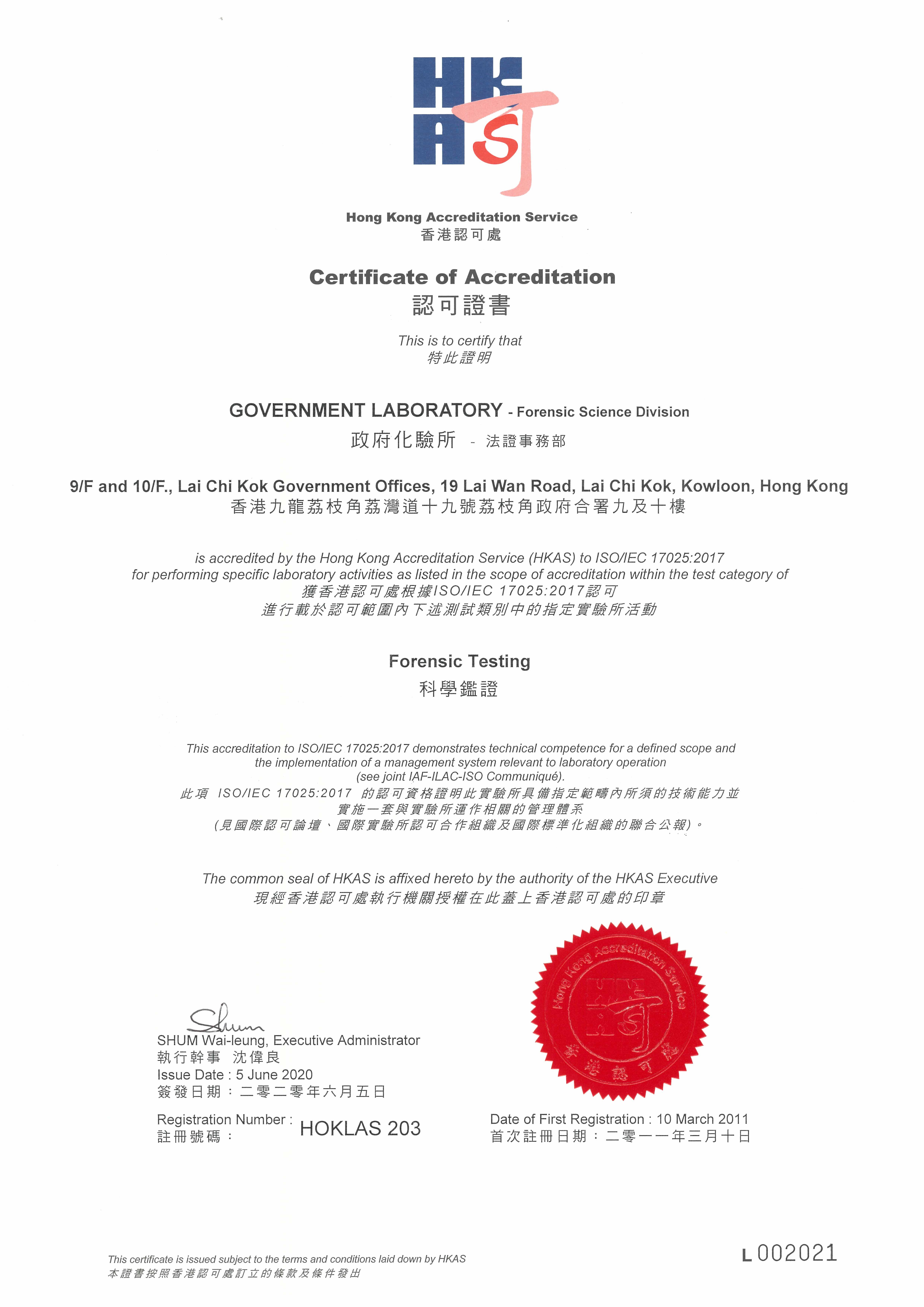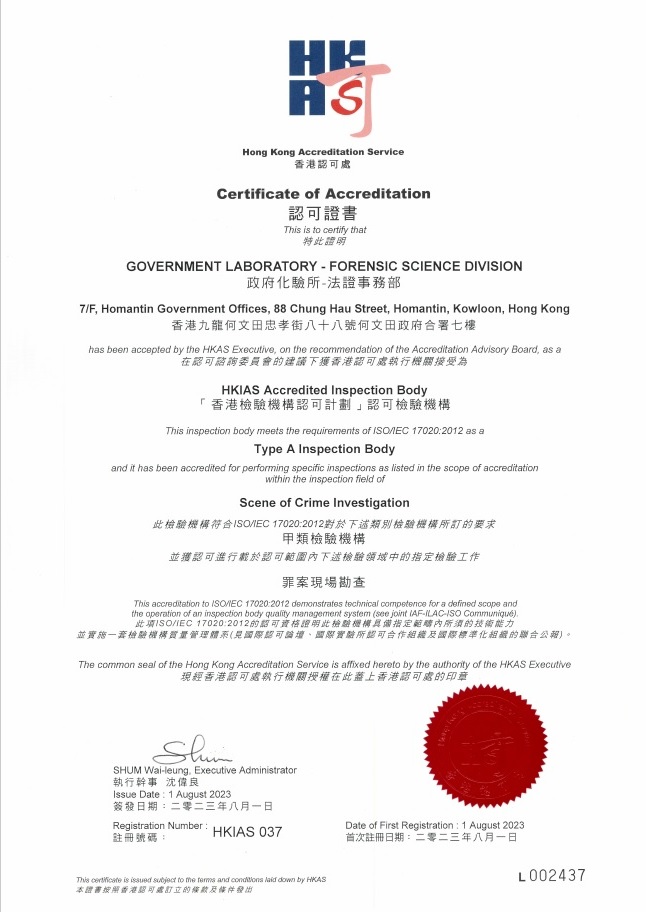Scene of Crime and Quality Management Section
Headed by one Senior Chemist, this Section comprises the Scene of Crime Unit and the Quality Management Unit.
Scene of Crime Unit
The Scene of Crime Unit provides a twenty-four hour scene attendance service to the Police and other law enforcement departments in Hong Kong. The service is supplied by a team of Scientific Evidence Officers (SEOs) who, at the grade of Laboratory Specialist Services Officer, have been trained specifically as crime scene examiners together with a team of officers at the grade of chemist from other operational sections.
Different from many overseas laboratories, the approach of using laboratory staff as well as general crime scene officers for a large number and wide range of crime scene examinations has been in operation in Hong Kong for many years and is a system which pays many dividends in terms of professional scene examination and effectiveness of exhibits recovered from scenes. In view of the often transitory and fragile nature of scientific evidential material at crime scenes, it is far better to have that material processed by a qualified and experienced officer with relevant scientific background.

3D scanning of crime scene
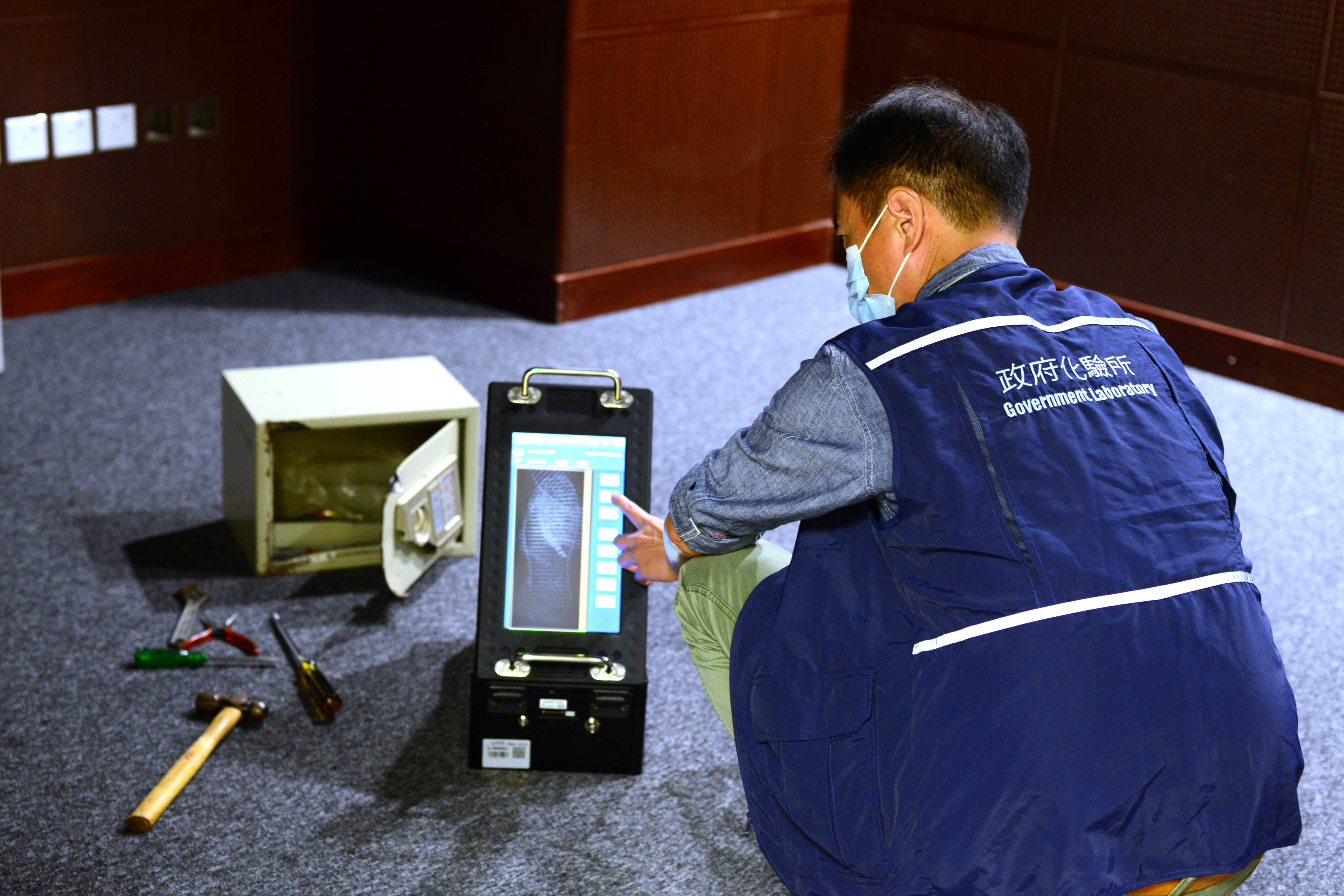
Collect shoeprint evidence
The SEOs provide a scene examination service for general crime scenes, which means that they go to most types of scenes. However, there are some types of scene examinations which require more specialized training and for which a professional officer with relevant expertise is better suited. Such scene examinations include traffic accident reconstruction, vehicle number restoration, fire investigation, bloodstain pattern interpretation, and investigating suspected illegal drug manufacturing/cultivation activities. Consequently, scenes falling into any of these categories are dealt with by officers from the appropriate section of the Division. Where necessary, the members of the unit attend scenes with other specialist professional officers as a comprehensive team.
In 2024, crime scene examiners attended a total of 389 crime scene visits, of which 137 were related to general crime scenes and 252 were related to specialised crime scenes.
The unit also provides the law enforcing officers a 24 hour advisory service on the scientific aspects of handling those crime scenes where attendance is not absolutely necessary. For cases requiring immediate attention, a round the clock laboratory examination service is available to offer timely information for subsequent criminal investigation and preliminary court proceedings.
Apart from scene examinations, the SEOs work in the laboratory as forensic counter exhibit officers, other duties include report writing, carrying out studies to keep abreast with the crime scene investigation techniques and lecturing to the police or other clients and Laboratory staff.
Every successful forensic investigation begins with a professional crime scene investigation. The latter cannot be achieved without the contribution and commitment of all members of the unit and specialist chemists, many of whom spend hours working outside normal office hours in unfavorable conditions.
The Unit demonstrates its impartiality, the suitability of the methodologies and equipment being used, and the technical competence of the staff involved in handling various crime scene investigation activities in full compliance with the accreditation requirements as stipulated in ISO/IEC 17020:2012.
The Quality Management Unit
The Unit is responsible for maintaining and developing the quality management system of the Forensic Science Division (FSD) of the Laboratory in accordance with the requirements as stipulated in ISO/IEC 17020:2012 and ISO/IEC 17025:2017 and other good laboratory practices.
The Forensic Science Division (FSD) has been accredited under ASCLD/LAB from 1996 to June 2011. Prior to the expiration of the ASCLD/LAB accreditation, the FSD made a transition from the ASCLD/LAB Legacy Program to a quality system which complies with the ISO/IEC 17025 standards under the Hong Kong Laboratory Accreditation Scheme (HOKLAS) provided by Hong Kong Accreditation Service (HKAS), the official accreditation body in Hong Kong. The FSD became the first laboratory in Hong Kong to acquire the accreditation status in the Forensic Testing category under the HOKLAS in March 2011. The FSD also became the first laboratory in Hong Kong to gain accreditation to ISO/IEC 17020:2012 for the examination of scenes of crime under the Hong Kong Inspection Body Accreditation Scheme (HKIAS) operated by HKAS in August 2023.
Under the directions of management and the Senior Chemist of this Unit (the latter is also designated as the Quality Assurance Manager of FSD), this unit coordinates all FSD operational sections in their quality assurance planning, provides them with quality assurance guidelines and monitors the implementation of quality measures. The Unit is responsible for maintaining and updating relevant quality documents, as well as carrying out management reviews and annual internal quality audits which are led by a team of fully trained and qualified staff auditors.
To ensure the provision of highest attainable quality service to clients and to comply with the ISO/IEC 17020:2012 and ISO/IEC 17025:2017 quality requirements, the Unit coordinates the operational sections in their proficiency testing programmes including those at international level with a view to establishing inter-laboratory comparability and traceability.

